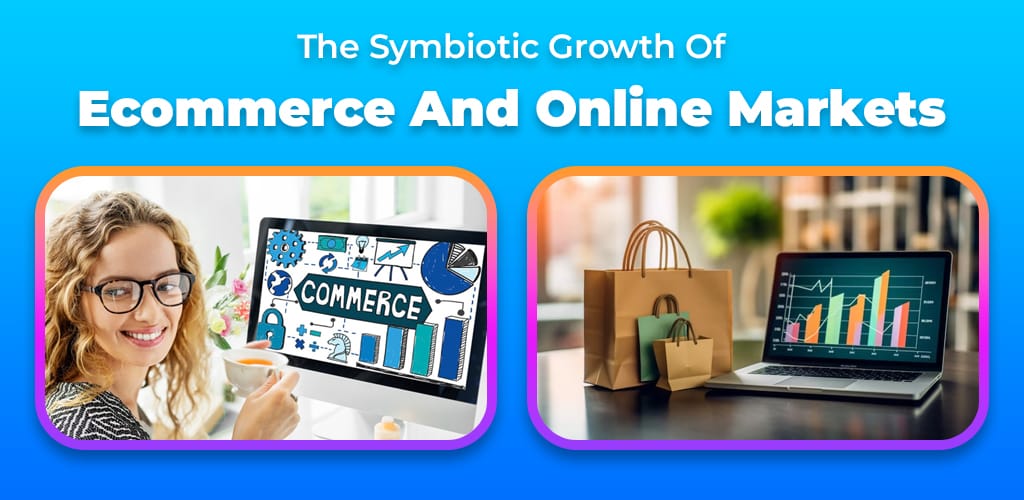The Symbiotic Growth Of Ecommerce And Online Markets
The commerce landscape has drastically changed in the new digital age, more so because of the ecommerce boom and the increase in online marketplaces.
These two are separate elements yet very complementary in the construction of a synergy that drives growth and innovation.
This blog will deal with the interrelation that exists between ecommerce and marketplaces, their related benefits, and future prospects of these two interlinked domains.
Understanding Ecommerce and Marketplaces

Ecommerce is a shortened form of the term “electronic commerce” and involves the buying and selling of goods and services over the internet.
It essentially cuts through a wide spectrum of business engagements from retail and wholesale to service transactions.
Ecommerce would be an online business of sorts: Shopify, Magento, or WooCommerce.
On the other hand, marketplaces would be online places where different vendors could place their products for sale to customers: large names like Amazon, eBay, and Etsy.
Marketplaces become middlemen; they are a platform on which sellers are placed in order to reach a wide audience and not have to worry about managing their own ecommerce infrastructure.
The Symbiotic Relationship

The relationship between ecommerce and marketplaces is a symbiotic one. Here are some key ways they complement each other:
1. Increased Exposure One of the very first benefits of marketplaces is their ability to reach out to vast audiences.
For an ecommerce business, utilizing marketplaces means tapping into large pools of potential customers who may not visit their standalone online store.
A growing reach will contribute highly toward sales as well as the visibility of the brand.
2. Low Entry BarriersSetting up and maintaining an independent ecommerce store can be really expensive and time-consuming for small businesses.
Marketplaces offer a cost-effective alternative.
Vendors have access to ready platforms where they can list their products, requiring a low financial input into website development, hosting, or digital marketing.
3. Trust and CredibilityMany marketplaces have already established their reputations with consumers; they are a built-in trusted source.
So, by selling through the marketplace, ecommerce businesses get this trust and credibility passed on to them.
Shoppers are more likely to buy from a marketplace they are familiar with and trust, rather than a seller they have never heard of.
4. Logistics and FulfillmentMany marketplaces have logistics and fulfillment services.
For instance, while fulfillment by Amazon does warehousing, packing, and shipping on behalf of sellers, it reduces logistic work for e-commerce businesses, which can concentrate more on product development and customer service.
5. Data and InsightsMarketplaces provide valuable data and insights into consumer behavior, preferences, and trends.
Business-to-consumer e-commerce business organizations can find an easy way to use this information to tune their strategies, optimize product offerings, and enhance customer experience.
With an understanding of what is selling, who is buying, and for what reason helps facilitate more informed decision-making.
Benefits to the Different Stakeholders

The symbiotic relationship between ecommerce and marketplaces creates value across the various stakeholders in the ecosystem:
For the Seller:
- Higher Volumes of Sales: Selling to a larger customer segment can cause sales volumes to be higher than expected.
- Cost Savings: Elimination or reduction in the need for significant investment in ecommerce infrastructure and digital marketing.
- More Efficient Operations: Utilization of marketplace logistics and fulfillment services.
For Buyers:
- Convenience: One stop for a variety of items being sold by multiple buyers.
- Trust: Purchase can be made with the peace of mind that many other people are making their purchases on such established marketplaces having consumer protection policies in place.
- Competitive Pricing: Increased suppliers put competitive pressure that can potentially drive the best pricing and deals.
For Marketplaces:
- Revenue streams from commissions and fees paid by sellers to list and sell products.
- Customer retention through a wide and varied range of products that keep customers coming back.
- Market Insights Find data on the behavior of consumers and trends to tailor the offers for the marketplace.
The Future of Ecommerce and Marketplaces

The future for e-commerce and marketplaces appears quite promising, and this is through the following trends:
1. Omnichannel IntegrationNowadays, consumers got used to a seamless shopping experience in any channel.
It’s also their omnichannel strategies that come in handy to ensure a coherent experience for shoppers whether they engage with the businesses in the physical stores, online, or on the mobile.
2. PersonalizationAdvancement in data analytics and artificial intelligence can now give more personalized shopping experiences.
The marketplaces adopt these technologies to provide tailored product recommendations, personalized marketing, and shopping experiences customized to help improve customer satisfaction and loyalty.
3. SustainabilityToday, sustainability is at the forefront of customers’ minds.
They are adopting sustainability, showcasing eco-friendly products, following sustainable practices, and gathering popularity for their green credentials.
It is a trend, along with the others, likely to define the future of online shopping.
4. Social CommerceThis is where marketplaces fit into the integration process of social media and ecommerce.
Social commerce allows users to shop via social media such as Instagram and Facebook. Marketplaces are becoming more social in selling, and influencers are used in driving sales.
5. Global ExpansionMarketplaces expand their reach globally for sellers to access international markets.
Cross-border e-commerce grows with the help of marketplaces by offering tools and services for international shipping, currency conversion, localization, etc.
Avasam Enterprise a Solution:

Avasam Enterprise helps revolutionise online marketplaces by providing a scalable platform that connects businesses with third-party suppliers for dropshipping.
This allows companies to expand their product range without the need for physical inventory. Avasam’s platform features vendor management integrations, high-quality listing and pricing tools, automated payment processes, and efficient returns management.
By leveraging these tools, businesses can meet consumer demands, increase sales, and operate more efficiently in the competitive ecommerce environment.
Conclusion
Ecommerce and Marketplaces go hand in hand, and each can support or compensate for the weaknesses of the other.
The growth that is symbiotic thus benefits the Sellers, Buyers and even the Marketplaces very well.
The partnership between e-commerce and marketplaces, now underpinning the digital economy, will only grow as technologies continue to change consumer expectations.
When well understood and maximized by businesses for the unique advantages they have in both e-commerce and marketplaces, this will be one way many more businesses set themselves up for success within a dynamically changing landscape for business online.
Whether you’re a small business owner looking to expand your reach or a consumer seeking convenience and variety, the interplay between ecommerce and marketplaces offers endless possibilities.



DropShip products from verified suppliers to diversify your inventory and scale your eCommerce business